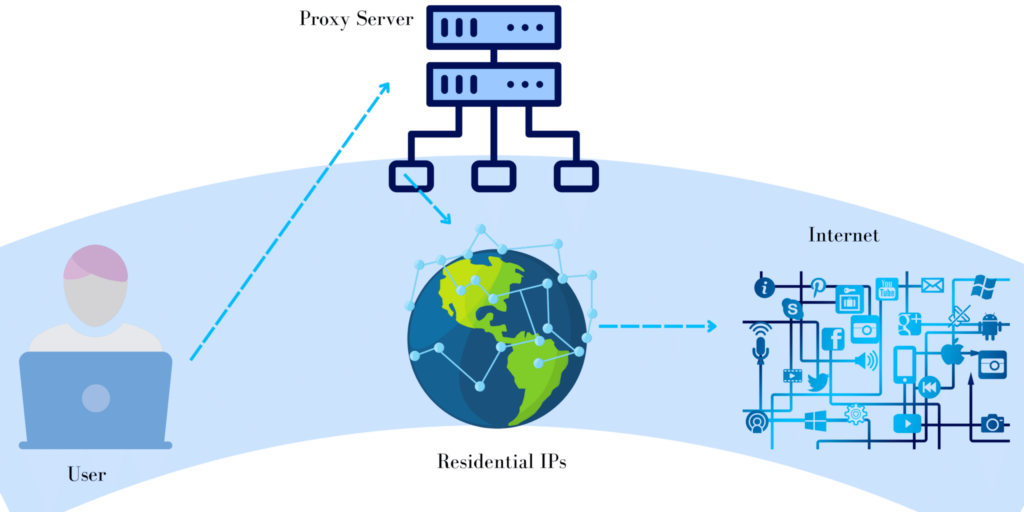If you’re here, you’re probably looking to learn more about how do residential proxies work and their role in your online endeavors.
Well, look no further! We’re here to help you understand the ins and outs of residential proxies and how they can help you get the most out of your online experience.
Let’s start by defining what a residential proxy is.
What are Residential Proxies?
A residential proxy is an IP address assigned to a physical home or business address. It is a proxy server used to mask a user’s true IP address and provide them with a new, temporary IP address that can be used to access online content. This proxy is typically used to access websites or services blocked in a certain country or to get around geo-restrictions.

How Do Residential Proxies Work?
So, how do residential proxies work? To understand this, we must first look at how the internet works. When you access a website, your computer sends a request to the server hosting the website. The server then responds with the content you are trying to access. This process is made possible by your IP address, which is like a unique identifier that tells the server where to send the data.
When you use a residential proxy, the request is sent from the proxy’s IP address instead of your own. This masks your true IP address and makes it appear that the request came from the proxy’s location. This lets you see content that your location might normally keep you from seeing or getting information without saying who you are.
The Technology Behind Residential Proxies

Proxy Servers
Proxy servers are computer systems or programs that go between a client and a server. The client connects to the proxy server, which then sends the request to the server. The response from the server is then sent back to the proxy server and then to the client. Proxy servers make web browsing faster and safer, get around filters, and access blocked websites.

IP Addresses
An IP address is a unique numerical address assigned to each device connected to a network. Residential proxies use residential IP addresses assigned to consumers’ physical locations, such as their homes or offices. This allows residential proxies to access websites as if they were coming from the same location as the user, making them more difficult to detect and block.

Protocols
Residential proxies use a variety of internet protocols to route data, including HTTP/HTTPS, SOCKS4/SOCKS5, and FTP. They also use TLS encryption to ensure secure connections. HTTP is the protocol to transfer web pages, while SSL is a security protocol to encrypt data sent over the Internet. TCP is used to establish connections between two machines.
So, now that you know a bit more about how residential proxies work, you may wonder how people use them.
What are Residential Proxies Used for?
Residential proxies can be incredibly useful for various activities, including data scraping, online marketing research, and more. They can also protect your online privacy and anonymity and access content otherwise unavailable in your own country.

Local Businesses
Residential proxies are invaluable for local businesses that need to monitor their competitors or track changes in their local markets. By using residential proxies, businesses can access local IPs to gain insights into their target market’s behavior, allowing them to make more informed decisions.

Online Shopping
Residential proxies are perfect for online shopping, as they allow users to access multiple online stores from different locations. This makes it easier to compare prices and get the best deals.

Sneaker Bots
Residential proxies are a must-have tool for anyone looking to use a sneaker bot. A sneaker bot is software that automates the purchase of limited-edition items like sneakers and apparel. Residential proxies provide the bot with a unique IP address, allowing the user to bypass any website security measures that may be in place.
This is important for bots to work because many websites have ways to find and stop bots from buying things. Residential proxies also keep the user from getting blocked from the website completely, making a better result.

Travel Deals
Residential proxies can be a great asset for those looking to save money on their next vacation. Using a residential proxy, the user can access travel deals from different countries worldwide. This allows them to compare prices and find the best deals, saving them significant money. Residential proxies also make it easy to get deals only available in certain countries or areas. This gives the user more choices.

Data Scraping
Residential proxies are also widely used for data scraping. Data scraping is collecting data from websites and other online sources. It can gather product information, pricing data, and even customer reviews. Using residential proxies, the user can hide their IP address and access the data without blocking the website. This is especially useful for gathering large amounts of data from multiple sources.

SEO and Market Research
Residential proxies are important for SEO and market research because they let businesses access local IPs to learn more about the people they want to reach. By using residential proxies, businesses can monitor their competitors’ SEO strategies and track changes in the SERPs.

Advertising
Residential proxies are ideal for advertising campaigns as they allow businesses to access different IPs to target specific demographics. This makes it easier to track advertising campaigns’ performance and ensure they reach the right audience.

Online Gaming
Residential proxies are perfect for online gaming, as they allow users to access different servers from different IPs. This makes accessing different gaming environments and getting the most out of the experience easier.

Social Media Automation
Residential proxies are also useful for social media automation. Using a residential IP address can prevent you from being detected by social media platforms, allowing you to automate certain tasks such as liking posts or following users.

Ad Verification
Residential proxies can also be used for ad verification. This means you can access your clients’ websites to check that their ads are displayed correctly. This ensures that your clients receive the best possible service from you and that their ads are displayed as expected.

Accessing Streaming Services
Residential proxies can also be used to access streaming services. This means you can access streaming services that may be blocked in your region or content that is only available in certain countries.
How to Set Up Residential Proxies
- Choose a Proxy Service Provider: First, you will need to choose a proxy service provider that offers residential proxies.
- Create an Account: Once you have chosen a provider, you must create an account with them. This will typically involve providing basic information, such as your name, email address, and payment information.
- Choose a Plan: After creating an account, you will need to choose a plan that fits your needs. You may purchase a certain number of residential proxies or a set amount of data usage.
Choose the Right Plan:
- Choose a plan that meets your needs. Consider how much bandwidth you need and the number of IPs you require.
- Consider the type of proxy you need. Residential proxies are typically more secure than shared proxies and have more reliable IPs and higher speeds.
- Determine the type of authentication you require. Some residential proxies require authentication, while others are anonymous.
- Decide on the location of the proxies. Choose a proxy provider that offers proxies in the locations you need.
- Research the reliability of the proxy provider. Check reviews and ratings online to ensure you’re getting a quality service.
- Choose the right pricing plan. Residential proxies can be expensive, so make sure you’re getting the best value for your money.
- Set Up Your Proxies: Once you have chosen a plan, you will need to set up your proxies. This typically involves providing your proxy service provider with the IP address of the devices on which you want to use the proxies.
- Test Your Proxies: After setting up your proxies, you should test them to ensure they are working properly. This can be done by visiting a website such as WhatIsMyIP.com and verifying that the IP address shown is the same as the one you provided to your proxy service provider.
In conclusion, residential proxies have come a long way in giving people the security and privacy they need on the internet. They are an attractive option for those looking for a secure internet connection and those who want to hide their IP address from prying eyes. Residential proxies are becoming more and more popular and are used by a lot of people. They are a great tool for anyone who wants to use the Internet safely and securely.
If you’re looking for a reliable, secure, and affordable residential proxy service, look no further than IPBurger.
Our residential proxies let you access content unavailable in your country and use multiple accounts while keeping your data safe and private.
Our proxies can also be used for SEO tasks, such as scraping and web data mining. With IPBurger, you can be sure your data is secure, and your IP address is hidden. Try IPBurger’s residential proxies today and get the connection you deserve!
What are the advantages of using residential proxies?
Residential proxies have several advantages over other types, such as more privacy and security, faster speeds, and better performance. The biggest reason to use residential proxies is that they are harder to find and block than other types. This makes them perfect for things like scraping data, getting to content, and online gaming. Additionally, residential proxies provide IP addresses from real residential IPs, which makes them more difficult to detect and block as they appear to come from legitimate users.
How do residential proxies work?
Residential proxies are an intermediary between a user and a website or service. When using a residential proxy, the user’s request is sent through the proxy, which acts as a middleman. The proxy then connects to the website or service, gets the user’s requested data, and sends it back to the user. By routing the user’s requests through the proxy, the user’s IP address is masked and their identity is protected.
Are there any risks to using residential proxies?
There are some possible risks when using residential proxies, just like any other proxy type. If the proxy is not properly set up or maintained, it can be vulnerable to attacks. Some residential proxies, like those for copy-protected content, can be used to get to content that isn’t meant for the public to see. Because of this, it is important to ensure the proxy is safe and set up correctly. Also, you should look into the residential proxy provider to ensure they offer a good service.



